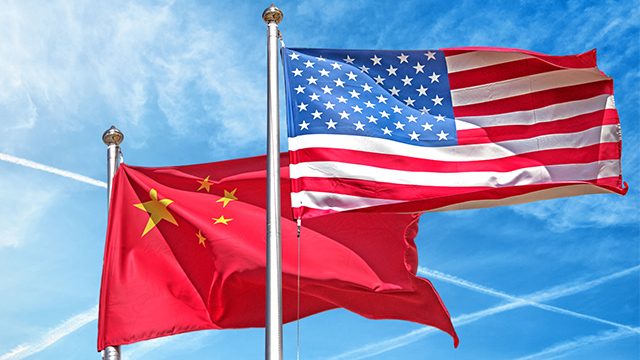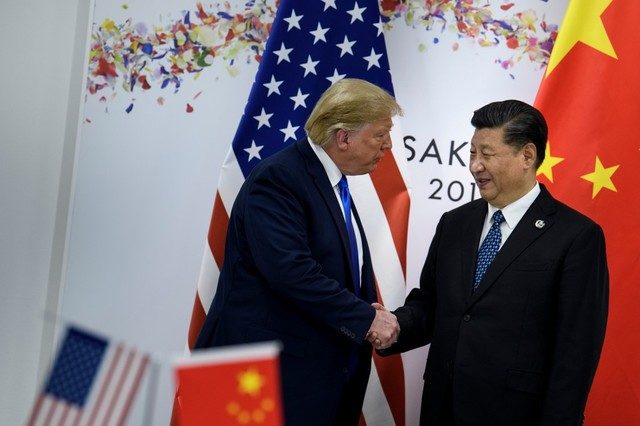SUMMARY
This is AI generated summarization, which may have errors. For context, always refer to the full article.

MANILA, Philippines – The United State’s view of China has grown increasingly negative over the last year, with about two-thirds of Americans saying they have an “unfavorable” view of the Asian country, results from a Pew Research Center Survey showed.
The Pew Center said the findings released on Tuesday, April 21, where 66% of Americans said they had “unfavorable” views of China was the highest negative rating for China since it started surveying the item in 2005. At the time only some 35% of Americans said they did not have a favorable opinion of China.
Negative ratings increased by 6 percentage points since 2019 and were up by nearly 20 percentage points from its rating of 47% at the start of the Trump administration.
The survey, conducted in March among 1,000 Americans, was done against the backdrop of the rapid increase in coronavirus cases, which were first found in China.
Despite this, Pew said news of China’s mishandling of the coronavirus outbreak in its early stages did not appear to make an impact on Americans’ views, though it emphasized this only applied to the time the surveys was done between March 3 to 29.
“While China’s handling of the virus may have made an impression on some Americans, it does not appear that escalating conditions in the U.S. over the course of March shifted attitudes toward China during that period,” Pew said.
Is it a partisan issue? The group noted both Republicans and Democrats expressed negative views of Beijing, as “both parties registered their most unfavorable opinions to date in 2020.”
The sentiment, however, was more pronounced among Republicans and Republican-leaning independents (72%) compared to Democrats and Democrat-leaning independents (62%).
Meanwhile, Pew noted younger respondents or those 18-29 years old also expressed more negative view of China, with over half (53%) saying they did not hold favorable opinions of the state – a first since 2005.
Xi not spared: Alongside this, Pew found positive views of Chinese President Xi Jinping were at “historically low levels” with 71% of Americans saying they have “no confidence in…Xi…to do the right thing regarding world affairs.”
Pew noted the decrease in Xi’s confidence levels dipped by some 21 percentage points from 2019 to 2020, whereas it was “fairly stable” over the last few years. Since the question was first asked in 2014, negative sentiments of Xi remained in the 50-60% range.
The group does not say what factors are behind the dip in Xi’s confidence levels.
Pew, however, pointed out that events in March “with regard to the role Beijing played in handling the initial (coronavirus) outbreak does not appear to have affected how Americans view President Xi in the short term.”
US President Donald Trump had taken to blaming China for the coronavirus, calling it the “Chinese virus” and accusing it of starting the virus deliberately. (READ: U.S. summons Chinese ambassador over coronavirus conspiracy theory)
Pew said respondents interviewed before and after the US government declared a national emergency over the coronavirus in March 13 expressed similarly negative views towards Xi. This cut across factors like age, gender, political affiliation, and level of education.

Wary of a giant: The same could be said for Americans’ attitudes towards China which included views on China’s economic standing, power and influence, military might, and environmental impact.
Pew found 9 in 10 US adults viewed China’s influence as a threat, 62% of whom described it to be a “major threat.” This view increased by 14 points since it was last asked in 2018.
But it is in the environmental impact of China’s activities, as well as cyeberattacks from the country, where American expressed the most concern. These issues were deemed to be “very serious” concerns with 61% saying China’s environmental footprint was a problem while 57% said cyberattacks posed a problem for the US.
Sentiments on other issues related to China were the following:
- 57% say China’s human rights policies pose a “very serious” problem
- 49% say the the US’ trade deficit with China is a “very serious” problem
- 52% say US job losses to China is a “very serious” problem
- 49% say China’s growing military power is a “very serious” problem
- 47% say China’s growing technological power is a “very serious” problem
Tensions between Hong Kong and China, which spurred violent protests between residents and state forces were of the least concern to Americans. Only 30% considered it as a serious problem for the US.
Meanwhile, when it comes to being a military leader, generational divides were seen as China’s growing military forces were a more serious concern for Americans 50 years old and above (61%). Only some 32% of younger respondents aged 18-29 saw it as a serious problem.
But regardless of whether or not the US is considered the leading economic or military power in the world, Pew found nearly all Americans say “a future with U.S. leadership is a better thing than one with Chinese leadership.”
“When forced to choose between which would be better for the world, 91% of Americans say it is better for the U.S. to be the world’s leading power than China (4%),” Pew said.
This has remain unchanged since the question was last asked in 2018. – Rappler.com
Add a comment
How does this make you feel?
There are no comments yet. Add your comment to start the conversation.